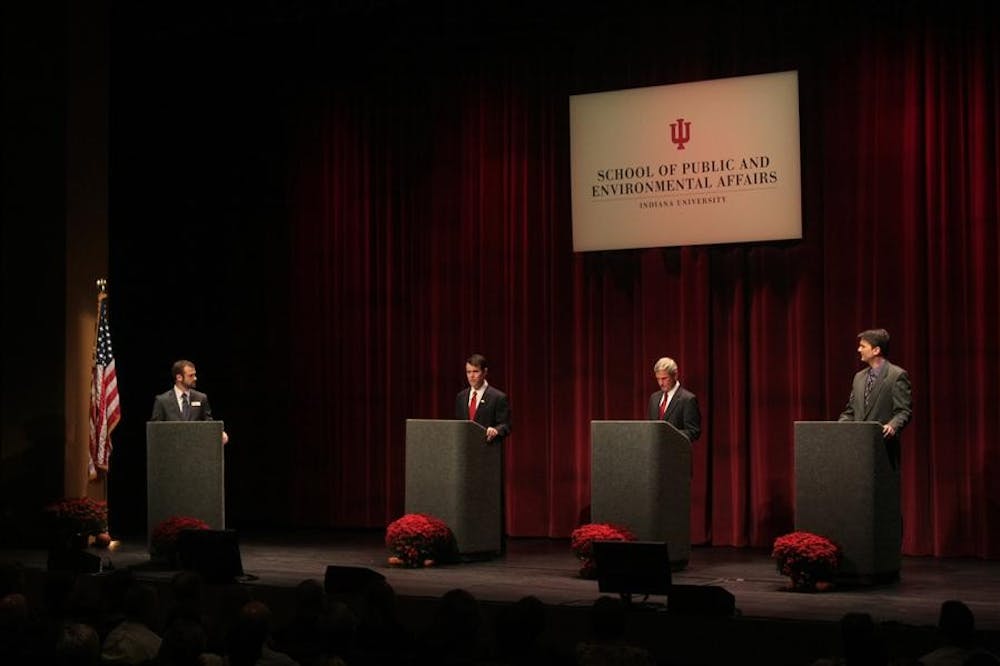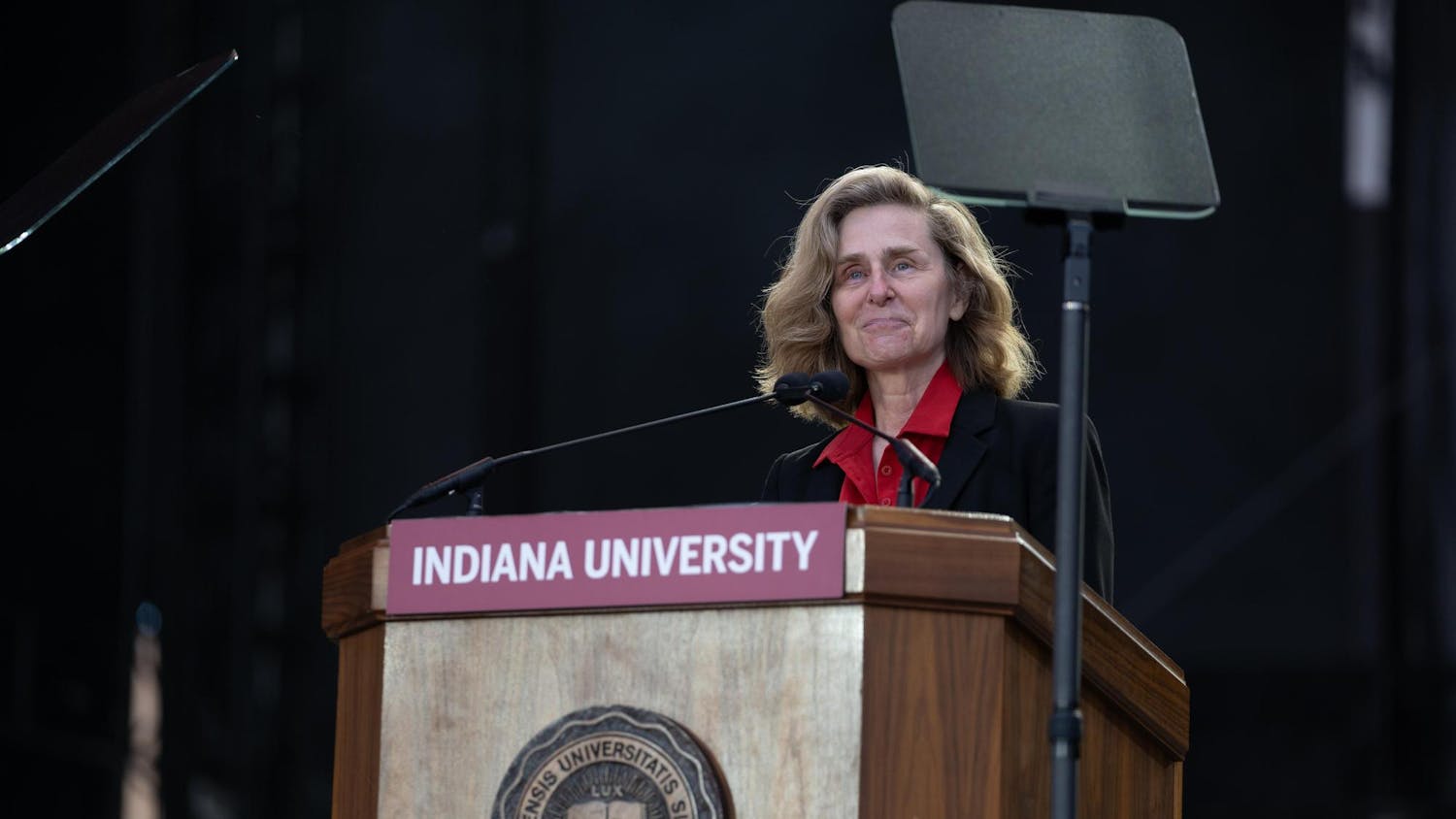With only two weeks left until Election Day, 9th District Congressional seat candidates debated Monday about issues ranging from the Don’t Ask, Don’t Tell military policy to tax cuts.
Rep. Baron Hill (D-9), Republican Todd Young and Libertarian Greg Knott discussed key topics while the audience at the Buskirk-Chumley Theater clapped, booed and did everything they were asked not to do on several occasions.
IU’s School of Public and Environmental Affairs sponsored the event in conjunction with the League of Women Voters of Bloomington-Monroe County, the Indiana Debate Commission and the IU Debate Team.
The candidates answered questions posed by moderator Brian DeLong, a SPEA lecturer and coach of the IU Debate Team. The candidates were each given one minute, 30 seconds to answer with 45 seconds for a rebuttal.
DON’T ASK, DON’T TELL
Knott said the Don’t Ask, Don’t Tell policy, while not a bad idea, is a failed piece of legislation. Originally intended to keep peace in the ranks, Knott said it has turned into a witch hunt for homosexuals serving honorably.
“Call me old-fashioned and Midwestern, but I don’t think it’s good manners for anyone, heterosexual or homosexual, to discuss their sexual activity in the workplace,” Young said.
Young, a former Marine, said it was originally implemented to discourage disunity among those serving in the military. He said that for now, there is not sufficient evidence to support the dismissal of this policy.
“It needs to end,” Hill said. “I voted to repeal it, and given the chance to repeal it, I’ll vote to repeal it again.”
He said that no one should be discriminated for their personal choices, and that the policy is plain wrong.
SOCIAL SECURITY
Hill said he has signed a contract promising that he will not vote for privatization of social security, which would be detrimental to those 55 and younger.
Hill put the contract on Young’s podium, encouraging him to sign it.
Young said after the debate that he does not support privatization, addressing Hill’s assertion during the debate that Young does.
Young said during the debate that fixing social security will require a bipartisan solution, which he is willing to work for.
“For those who are my age, we’re going to have to ensure that the program remains solvent, because it’s important,” Young said.
Knott said the tax system needs to be overhauled to address social security.
“We used to have many more workers to support fewer retirees,” Knott said. “Now we are faced with a shrinking work force to support an expanding retiree population.”
TAX CUTS
The Bush administration supported income based tax cuts. DeLong asked the candidates if they supported these cuts.
Knott said that there is no such thing as a tax cut, but only a tax deferral, which would need to be paid later.
“That hurts our economic security, and it’s wrong,” Knott said. “It’s the wrong policy for Southern Indiana.”
Knott said he is not for tax cuts but for cuts in government spending on some of the most expensive government-funded institutions, such as the military.
He said countries where the U.S. spends money for security, such as Japan and Germany, should pay for their own national security.
Young said the worst thing to do in a poor economy is to raise taxes.
“That’s going to kill jobs,” Young said.
He said that once the economy is improved, the government can look at raising taxes again, but for now it would seriously harm Americans.
Hill said he agrees with the Bush proposal to give tax cuts to those who make $250,000 or less annually.
He said, though, that extending those cuts to the wealthy would increase the national deficit without good cause.
CAMPAIGN CONTRIBUTIONS
DeLong asked the candidates how they felt about the recent Supreme Court decision that increases the rights of corporations to support campaign efforts.
“I actually think that recent Supreme Court decision was the right decision,” Young said. “I believe that corporations, like unions, do have the right of free speech.”
Young encouraged all Americans, be they individuals or corporate entities, to express their views by attending debates or speaking directly to representatives.
“Ultimately on these decisions I defer to the Supreme Court,” Young said.
Hill disagreed with Young’s view.
“The Supreme Court sometimes gets it right and sometimes they get it wrong,” Hill said. “They got it wrong this time.”
He said that those with less money to contribute would not be able to compete with corporations and may have their voices drowned out.
“Do we want oil companies and big energy companies controlling what the message is going to be on television?” Hill said.
Knott agreed with Hill on this issue.
“It was wrongly decided, and we have too much corporate money influencing our elections,” Knott said.
Knott said he is the only candidate of the three that has signed the Fight Washington Corruption Pledge, which he said 200 other candidates nationwide have signed.
He said this pledge addresses corruption bred from financial contributions in Washington, and encouraged the other candidates to sign it as well.
ENVIRONMENTAL POLICY
Hill discussed a recent bill that did not pass through Congress that he supported. The bill would have imposed a cap and trade tax on factories with high carbon emissions.
Hill said the bill would have reduced carbon emissions, created up to 30,000 jobs, and made the U.S. energy independent.
Hill said carbon emissions need to be reduced as soon as possible because they cause global warming.
“The bill does a lot of good for the environment, and for our people and for air that we breathe,” Hill said.
Knott opposed this bill. He said he would have voted against it as Senate candidate Brad Ellsworth (D-08) did because it kills jobs in factories.
He also said he is unsure whether global warming is man-made, but if it is, countries with higher emissions than ours, such as China, must be considered accountable as well.
Young also said he was unsure about the cause of global warming. He said scientists support both sides of this argument, and he plans to follow new scientific discoveries about the matter.
He said even if global warming is man-made, the bill that did not pass is not the proper solution.
“This cap and trade energy tax is likely to be the largest tax increase in American history,” Young said.
He said that many businesses would be bankrupt by this tax if it were passed during a poor economic period.
“It’s going to hurt businesses and consumers alike,” Young said.
FORECLOSURE POLICY
DeLong asked if the federal policy response to the foreclosure crisis has been appropriate or if it could be improved.
Hill said there is clearly a housing and mortgage problem in the United States, and that it was the main cause of the current economic status.
“The federal government needs to do a better job, quite frankly, overseeing this,” Hill said. “This did not happen overnight.”
He said that Congress recently passed a bill that will address this problem, which he said is a step in the right direction.
Knott accused Hill of not taking responsibility for his vote against the 1993 Banking Company Act, which would have been an amendment to the 1991 Banking Companies Act.
He said the recently passed bill is not strict enough, but the Banking Company Act would have been.
“Like so many of these national issues, ultimate responsibility does rest at the feet of Congress,” Young said.
He said before the current economic crisis, Congress passed well-meaning legislation to encourage banks to give out loans they otherwise would not have given to provide more people with the opportunity to own homes.
“It had some unintentional consequences,” Young said.
Young said more reforms will be needed to correct the problem.
HEALTH REFORM
DeLong asked for the candidates’ stances on health care reform in light of the changes that currently came into effect because of the Patient Protection and Affordable Care Act.
“I’m glad I voted for the bill,” Hill said.
Hill named many changes the act has made that he considers positive. He said insurance denial because of pre-existing conditions no longer exist, and more children now have access to health care.
He also said students having trouble finding a job can stay on their parent’s health insurance, which is a very positive change.
Knott said the act did not address the cost of health care, which is the most important problem that needs to be considered.
Young agreed with Knott, saying that the act has actually increased the cost of health care.
He said that he supports health care reform, but that it needs to be addressed differently.
“It’s bad legislation,” Young said.
U.S. IN AFGHANISTAN
DeLong asked if troops should remain in Afghanistan. He also asked what each candidate’s defensive policies would be if elected.
Young said the current mission is murky, and faults Congress for not asking tougher questions about the goal of the Afghanistan mission.
He said he does not agree with the current timeline to bring the troops home because it is arbitrary.
Hill disagreed, saying that progress is being made in the Middle East. He said the Pakistani army is ready to fight the Taliban if the U.S. can help.
“The president kept his word in Iraq, and I think he’s going to keep his word in Afghanistan,” Hill said, referring to the president’s promise to bring the troops home as soon as possible.
Hill said the mission is clear and that it is to diminish the power of the Taliban to inflict harm on others.
Knott said the troops need to be brought home as soon as possible so that money previously spent on the military can be spent on the economy and on K-12 education.
“Occupying an entire country with a heavy footprint is the wrong policy,” Knott said.
Congressional candidates debate at Buskirk-Chumley Theater

Get stories like this in your inbox
Subscribe





